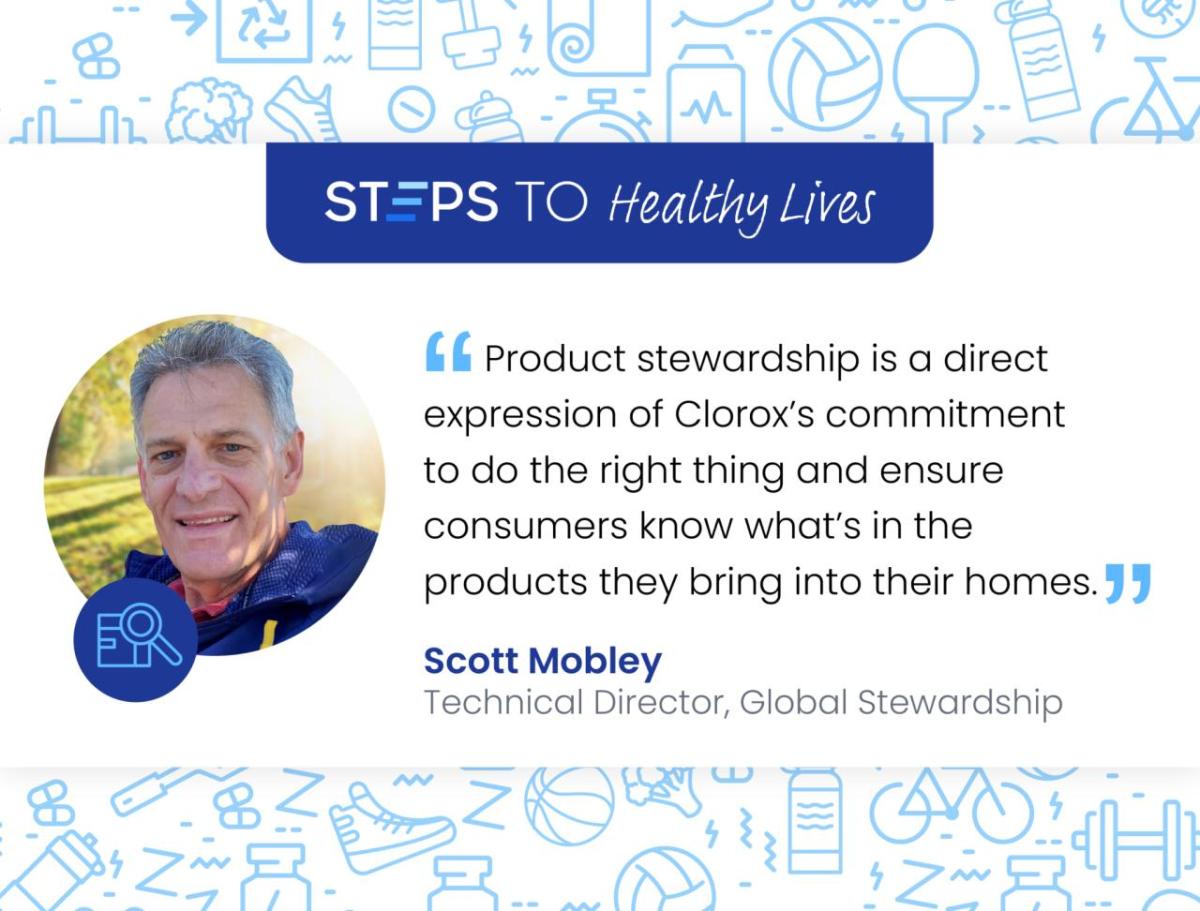Clorox’s Global Stewardship Director Talks Ingredient Management and Transparency
Steps to Healthy Lives: Raising the bar on product transparency

Clorox’s ESG goals are integrated into our IGNITE strategy because we believe they drive growth and create positive value for our brands, people and communities. We’ve focused on where we can make the biggest impact — Clean World, Healthy Lives and Thriving Communities — and have 20 public-facing goals in these areas.
The next installment of our “Steps to …” series focuses on Clorox’s commitment to responsible product stewardship, with a focus on ingredient management and transparency. We spoke with Scott Mobley, a technical director on Clorox’s Global Stewardship team, to learn more about the progressive action we’re taking to enhance our own practices and those of the CPG industry overall.
What does product stewardship look like at Clorox? Why are our goals important?
Product stewardship is a direct expression of our commitment to do the right thing and ensure consumers know what’s in the products they bring into their homes. Our ESG goals that support this work focus on responsible and progressive actions that enhance both Clorox and the CPG industry’s product ingredient transparency practices. When done right, we’re giving consumers the trust and confidence to choose products that are right for them and their families — and that’s essential to our purpose to champion people to be well and thrive.
What steps is Clorox taking to be more transparent about the ingredients used across its portfolio of products?
An early product transparency effort for Clorox was creating publicly available restricted substances lists for both our U.S. professional and retail cleaning products — meaning these ingredients are not intentionally added to our products in those categories. This is especially important for our consumers, as it helps them easily verify whether cleaning products contain ingredients they don’t want in their households. Having met this initial goal for our domestic retail cleaning products in 2020 and professional products in 2021, we’re currently evaluating the possible development of additional lists for some of our other product categories by 2025.
Clorox also helped develop an industrywide labeling tool, SmartLabel, which gives consumers a way to easily access detailed information for a wide range of U.S. retail products in a single place, using a consistent digital format. In partnership with the American Cleaning Institute trade association, we recently became the first company to add user-friendly definitions to SmartLabel so consumers can better understand the function of each ingredient in our cleaning products.
All of Clorox’s cleaning and disinfecting products sold in the U.S. are currently searchable in SmartLabel, and one of our goals is to expand our scope for providing consumer-meaningful information through this tool. Other companies are expected to follow, which is a great example of how work in this space will not only benefit Clorox but the entire industry.
How does Clorox engage with external stakeholders, such as NGOs or consumer advocacy groups, to proactively advance this work?
The perspective and insight we receive from our external stakeholders is critically important to how we approach our product stewardship goals. Whether it’s the consumers who use our products every day, the NGOs that advocate for increased chemical safety, or investors that rate our company on ESG progress, we want our efforts to resonate with all our stakeholders. Importantly, our product stewardship goals also depend on collaboration with external groups to achieve and verify them, which helps build trust with our consumers.
For instance, in 2021 we began participating in the Chemical Footprint Project to help measure and disclose data related to the chemistries used in our U.S. professional and retail cleaning products. A product’s chemical footprint is a relatively new concept that is akin to how a carbon footprint measures carbon emissions and is intended to benchmark progress toward the use of less hazardous materials. We’re working to improve our footprint’s survey score for our domestic cleaning portfolio 50% by 2030 with an interim target of 35% by 2025.
Another goal focuses on the development and sales of products with targeted certifications and product transparency affiliations, such as the U.S. Environmental Protection Agency’s Safer Choice and the U.S. Department of Agriculture’s BioPreferred programs. In order to earn these certifications identifying products that are safer for human health and the environment, they must go through a rigorous third-party review process to ensure they offer ingredient alternatives without compromising quality or efficacy. I’m proud to say that Clorox has been named an EPA Safer Choice Partner of the Year six times.
Each goal was developed with a specific eye to where Clorox could be a leader and have meaningful impact. I’m proud of every one of the goals and the progress we are making against them.
Which of Clorox’s product stewardship goals are you particularly proud of? Are any of these commitments unique?
Our chemical footprint goal is probably the most unique. When we first decided that we wanted to have a chemical footprint goal, we weren’t sure if we were going to develop a metric on our own or whether we would participate in an existing program. At that time, there were no other companies that were reporting on their cleaning product chemical footprint, so we researched several options before ultimately joining the Chemical Footprint Project. We’re seeing more and more companies disclose this information each reporting cycle, but I like to think we were a leader among our peers in recognizing the importance of assessing our chemical footprint.
Our ESG commitment is driven by our purpose to champion people to be well and thrive every single day. Learn more about our ESG goals here. Want to make a positive impact on the world? Learn about Clorox careers here.

